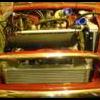anybody see the column in the mini mag about britain are now gonna be putting ethanol in fuel to make it cleaner i presume. It also states that it won't be very good for older style cars.
Ethanol In The Fuel
#1

Posted 05 May 2013 - 09:25 AM
#2

Posted 05 May 2013 - 09:28 AM
http://www.dailymail...damage-car.html
bit more of an in depth read states that it perishes rubber faster so will screw our dual system quicker.
#3

Posted 05 May 2013 - 09:34 AM
"It is due to be launched in the UK later this year, alongside standard petrol and other green fuels."
Alongside? So standard stuff will still be available ![]()
#4

Posted 05 May 2013 - 09:41 AM
the amounts they are putting in are unlikly to cause an issue, in fact theres probably some in higher octane fuel already.
#5

Posted 05 May 2013 - 09:51 AM
Helps cut costs I suppose?
It defiantly is bad news for old engines
Trac
#6

Posted 05 May 2013 - 10:51 AM
I think the article stated that the high octane stuff ie v power etc is safer.
#7

Posted 05 May 2013 - 12:04 PM
There is some good info here as well http://www.groups.tr...nol-update.html
One of the main issues with Ethanol is that it's hydroscopic i.e. it absorbs water like a sponge. This becomes a problem mainly when there isn't a great turnover of fuel going through your system for example you only use it at the weekends or when the weather is good. You can find that your fuel goes off, starts absorbing water and also starts to loose it's octane rating!
As it's already been said, the higher octane fuel's are safer, although adding ethanol to fuel raises it's octane rating, what they won't or don't tell you is that Ethanol contains less energy than petrol so you will probably find that your MPG on Ethanol based fuels is less that good old plain petrol. http://zfacts.com/p/436.html
If your worried you can use something like this especially if your car doesn't get an awful lot of use;
It's got Ethanol protection, raises your octane by two points, has a lead substitute (if you need it) as well as a fuel stabiliser so it doesn't go off quickly.
http://www.millersoi...sector=Classics
http://www.millersoi.../VSPe Range.pdf
What would be great for us Mini owners would be if they would bring back good old 4/5 star fuels! That isn't going to happen thought!
#8

Posted 05 May 2013 - 03:04 PM
#9

Posted 05 May 2013 - 03:44 PM
They want to try some of my stuff..!!
Trac
#10

Posted 05 May 2013 - 04:29 PM
Indeed!
Booze for me, petrol for the car.
Technically does this now mean that my car is a drink driver?
#11

Posted 05 May 2013 - 04:45 PM
Technically does this now mean that my car is a drink driver?
....."Ello Ello Ello, what's been goin' on ere' then?.... You were all over the road back there, been drinking this evening 'ave we sir?"
..... "Not me occifer, but the car did get tanked up with some of that new ethanol petrol earlier on tonight"
#12

Posted 23 May 2013 - 08:40 AM
Hi here is an article from the frost website that you may find useful: http://www.frost.co....gainst-ethanol/
If you use petrol for your family car, classic car, boat, motorcycle, Quad, lawnmower, strimmer, rotavator, chainsaw, generator, pump or any other type of equipment that has a petrol engine, you need to know about Ethanol in your fuel.
What is Ethanol?
Ethanol, also called ethyl alcohol, pure alcohol, grain alcohol, or drinking alcohol, is a volatile, flammable, colourless liquid. Best known as the type of alcohol found in alcoholic beverages, it is also used in thermometers, as a solvent and as an alcohol fuel. In common usage, it is often referred to simply as alcohol or spirits.
Where does it come from?
Ethanol is sustainable and domestically produced from renewable resources such as corn, grains and potatoes.
Why add Ethanol to Petrol?
Ethanol is good for our agricultural economy and helps us reduce our dependency on foreign petroleum products. On the “green” side they are aimed at improving air quality and reducing air pollution from fuel emissions.
What proportion of the fuel is Ethanol?
Permitted ethanol content in petrol is 5% which is to rise to 10% in 2013. However we are led to believe supermarket fuels may already have as much as 10% ethanol blended in. We hear a 15% mix is on its way in the USA.
While this is good for the domestic farmer and our environment, Ethanol can cause serious problems to your engine and fuel system. Generally vehicles built after 1996 have been designed with Biofuels in mind, but earlier cars and engines with carburettors are going to need help. What types of problems have been encountered?
1) Water accumulation in the fuel tank - ethanol absorbs water from the air. The water condenses in the fuel tank and will pull the ethanol out of suspension with the petrol. This is bad news because it strips the octane out of the petrol, leaving you with a layer of octane-poor fuel on top and a water-ethanol layer mixture on the bottom. If this gets sucked into the combustion chamber, you will have poor starting and very rough running with potentially engine damage.
2) Deposit is like to build up - Ethanol when mixed with water readily forms Gums in the fuel system much quicker than fuel without Ethanol. These Gums coat fuel system components including filters, carburettors, injectors, throttle plates and will then form varnish and carbon deposits in the intake, on valves, and in the combustion chamber.
3) Lower fuel mileage, Decreased performance and acceleration. Ethanol contains less chemical energy than petrol does, and this means less mileage for the driver. 3-5% drops in mileage are expected.
4) Corrosion of internal engine components - Water contamination may cause fuel system corrosion and severe deterioration.
5) Contaminants in fuel system – water, degraded rubber, plastic, fibreglass and rust may get drawn in.
6) It could encourage microbial growth in fuel. Ethanol being organic and hygroscopic may allow the growth of fungus.
7) Short shelf life - as short as 90 days
8) Corrodes plastic and rubber - Ethanol is a strong, aggressive solvent and will cause problems with rubber hoses, o-rings, seals, and gaskets. These problems are worse during extended storage when significant deterioration could take place. Hoses may delaminate, o-rings soften and break down, and fuel system components made from certain types of plastics could either soften or become hard and brittle, eventually failing. Fuel system components made from brass, copper, and aluminium may oxidize. The dissolved plastics and resins now in the fuel could end up in blocked fuel filters or gummy deposits.
9) Melts Fibreglass - bikes and boats with fibreglass fuel tanks can have structural failure as the Ethanol will break down and pick-up some of the materials the tanks are made from. Again this material, dissolved from the tank, can be carried through the fuel system and can cause damage to carburettors, fuel injectors and can actually get into the combustion chambers.
Protect Against Harmful Impact of Ethanol Blended Petrol with Frost Ethomix
 Frost Auto Restoration Techniques introduces an additive to protect against the harmful impact of Ethanol blended petrol. Frost Ethomix additive will combat the significant damage Ethanol blended fuel can cause to cars, motorcycles and non-road equipment that do not have compatible fuel systems. Ethomix is formulated to prevent corrosion in fuel systems and internal engine components, gum and resin build-up, clogged carburettors, injectors, filters and fuel lines, plus aggravation of water and moisture problems in fuel storage or unused engine situations.
Frost Auto Restoration Techniques introduces an additive to protect against the harmful impact of Ethanol blended petrol. Frost Ethomix additive will combat the significant damage Ethanol blended fuel can cause to cars, motorcycles and non-road equipment that do not have compatible fuel systems. Ethomix is formulated to prevent corrosion in fuel systems and internal engine components, gum and resin build-up, clogged carburettors, injectors, filters and fuel lines, plus aggravation of water and moisture problems in fuel storage or unused engine situations.- Prevents corrosion in the fuel system & internal engine components
- Protects against gum & resin build-up & carbon deposits
- Prevents clogged carburettors, injectors, filters & fuel lines
- Compatible with 2 & 4 stroke petrol engines
- Stabilizes Ethanol-blended fuels
FAQs
Will the Ethomix additive, when added to pump petrol, counteract all the problems Ethanol blended fuels will cause to Classic Cars?
We think we have a pretty good product, but regrettably it will not cure all the ethanol issues.
Can you provide details on how Frost Ethomix protects against the effects of ethanol?
Frost Ethomix additive contains several functional components, a pHe buffer to control acid formation, a filming corrosion inhibitor to protect ferrous metals and a polymeric dispersant which provides the detergency claims.
What tests have been carried out to prove it works?
Frost Ethomix has been tested using industry standard test methods, ASTM methods for corrosion and pHe and CEC test protocols for detergency performance.
Not only that, in 2012,Frost Ethomix passed the fuel stability additive test programme and now endorsed by the Fenderation of British Historic Vehicle Clubs (FBHVC) as a fuel additive for protection against corrosion in metals.
In particular, can Frost Ethomix prevent galvanic corrosion in carburettors for example where electronically dissimilar metals are used?
Frost Ethomix will not protect against galvanic corrosion as this is a metallurgy issue. There are no corrosion inhibitor additives which can overcome galvanic corrosion.
Will Frost Ethomix mix with other additives?
Frost Ethomix Additive is compatible with leaded petrol and lead replacement additives.
What materials should be changed or avoided (or regularly checked)?
Zinc and galvanised materials, Brass, Copper, Lead / tin coated steel. (Aluminium), Buna-N (seals), Neoprene (seals), Urethane rubber, Acrylonitrile-butadiene hoses, Polybutene terephthalate, Polyurethane, Nylon 66, Fibreglass-reinforced polyester and epoxy resins, Shellac, Cork.
1 user(s) are reading this topic
0 members, 1 guests, 0 anonymous users

















